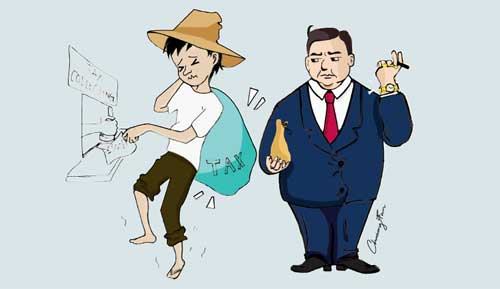|

China's top legislature has received more than 230,000 public submissions in just over a month on a draft amendment to increase the minimum threshold for personal income tax from 2,000 yuan ($308) per month to 3,000 yuan ($462).
The draft also proposes a reduction in the number of income tax brackets from the current nine to seven. Thrown open for public opinion on April 25, 2011, the provision seeks to amend China's Personal Income Tax Law that was first introduced in 1980.
Supporters think the threshold should be raised as it relieves burdens on wage earners and will help them better adjust to inflation and the surging living costs. Those who are against the amendment maintain that it will not achieve the expected goal of boosting the domestic demand, but will widen the income gap instead of narrowing it.
FOR
Xu Lifan
Beijing Times
I am in favor of raising the threshold of the personal income tax. In China, people in the lower and middle income brackets make up nearly 65 percent of personal income tax contributions. It contrasts sharply with that in Western countries where affluent people shoulder the majority of the tax and also diverges from the principles of tax equality and paying tax according to one's ability. Launching taxation reform should change this situation and the government is financially capable of doing so. With inflation again biting hard in China, reducing the burden of people in the lower and middle income brackets will increase their financial ability of coping with surging cost of living.
Liu Ge
Financial commentator
The action will win the public's support and praise and is long overdue. The tax should target the wealthy. However, according to statistics, the average monthly salary in Beijing in 2009 had reached about 4,000 yuan ($616). We can learn from other countries' personal income taxation system, which demands the rich shoulder the burden. For example, in America, rich families make up about 1 percent of society. Their annual income is 19 percent of the national total. But the tax they contribute takes up 39 percent of the total personal income tax collected. This is a fairer situation.
Huang Zhizi
Procuratorial Daily
I disagree with those who oppose to raising the standard with the excuse of it weakening people's awareness of paying tax.
As is known, the main function of taxation is to regulate income distribution. Fostering public awareness of paying tax detracts from the main purpose of taxation.
Even if the current standard threshold is kept, will it have any influence on enhancing people's awareness of paying tax? I don't think so. In actuality each company pays tax on behalf of their employees, who then have this amount deducted from their salaries. It is not every individual who goes to the government and pays the tax personally. Therefore, I can't see how this relates to people's awareness of paying tax. Moreover, not paying income tax doesn't mean people not paying tax. To enhance public awareness, it is more practical to show how much people pay for tax in daily shopping, for example, by noting the tax amount on store receipts.
|